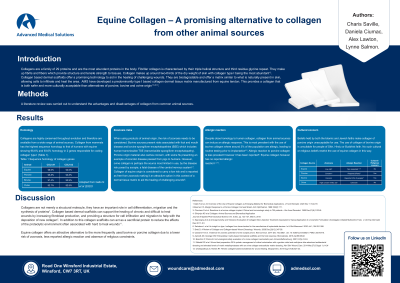Laboratory Research
(LR-048) Equine Collagen – A promising alternative to collagen from other animal sources
Friday, April 28, 2023
7:15 PM - 8:30 PM East Coast USA Time

Daniela Ciumac, PhD – Advanced Medical solutions; Alexis Harding, BSc – Advanced Medical solutions; Alex Lawton, BSc – Advanced Medical solutions; Lynne Salmon, BSc – Advanced Medical solutions
Introduction:
Collagen based wound dressings offer a promising technology to aid in the healing of challenging wounds and collagen based wound products are becoming increasingly popular. AMS have developed a type I collagen based dressing product manufactured from equine tendon collagen. This offers a safer and more culturally acceptable collagen source than some other common animal derived collagen products.
Methods: A literature review was carried out to understand the advantages and disadvantages of collagen from common animal sources
Results: Collagen Type I is highly conserved throughout evolution and is therefore available from a number of animal sources. Many of the products currently available on the market are derived from collagen of bovine or porcine origin which presents a number of concerns. The major one of which is the risk of zoonosis from collagen of both porcine and bovine origin and has drastically hindered the use of ovine collagen, due to susceptibility to scrapie. A second concern is that of allergic reaction, and it has been found that approximately 3% of the population show allergic rection to bovine collagen. Additionally cultural and religious beliefs around the use of porcine and bovine animals can present challenges and limit their application. The use of Equine collagen however can mitigate several of the concerns presented above. There is much less concern around zoonosis from equines and no allergic reaction has been reported against equine collagen. Equine collagen also shows a higher homology to human collagen than porcine, making it an attractive alternative for the manufacture of biomaterials
Discussion: Type I collagen offers a promising biomaterial to aid wound healing. It can act as a physical scaffold with roles in supporting cell proliferation and migration. Additionally collagen can act as a sacrificial protein in wounds with high levels of aberrant protease activity, allowing the healing tissues to be spared. Equine collagen offers an attractive alternative to collagen of other common animal sources due to a lower risk of zoonosis, allergic reaction and religious constraints.
Collagen based wound dressings offer a promising technology to aid in the healing of challenging wounds and collagen based wound products are becoming increasingly popular. AMS have developed a type I collagen based dressing product manufactured from equine tendon collagen. This offers a safer and more culturally acceptable collagen source than some other common animal derived collagen products.
Methods: A literature review was carried out to understand the advantages and disadvantages of collagen from common animal sources
Results: Collagen Type I is highly conserved throughout evolution and is therefore available from a number of animal sources. Many of the products currently available on the market are derived from collagen of bovine or porcine origin which presents a number of concerns. The major one of which is the risk of zoonosis from collagen of both porcine and bovine origin and has drastically hindered the use of ovine collagen, due to susceptibility to scrapie. A second concern is that of allergic reaction, and it has been found that approximately 3% of the population show allergic rection to bovine collagen. Additionally cultural and religious beliefs around the use of porcine and bovine animals can present challenges and limit their application. The use of Equine collagen however can mitigate several of the concerns presented above. There is much less concern around zoonosis from equines and no allergic reaction has been reported against equine collagen. Equine collagen also shows a higher homology to human collagen than porcine, making it an attractive alternative for the manufacture of biomaterials
Discussion: Type I collagen offers a promising biomaterial to aid wound healing. It can act as a physical scaffold with roles in supporting cell proliferation and migration. Additionally collagen can act as a sacrificial protein in wounds with high levels of aberrant protease activity, allowing the healing tissues to be spared. Equine collagen offers an attractive alternative to collagen of other common animal sources due to a lower risk of zoonosis, allergic reaction and religious constraints.

.png)